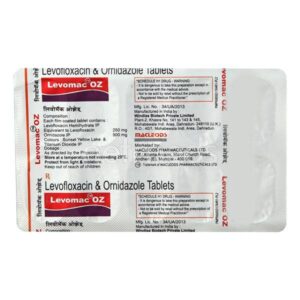ORNIDAZOLE + LEVOFLOXACIN
Ornidazole: Ornidazole is an antimicrobial drug used to treat various bacterial and protozoal infections. It belongs to the class of nitroimidazole antibiotics and works by targeting the DNA of bacteria and parasites, preventing their growth and replication.
This drug is commonly used to treat:
1. Bacterial infections: Ornidazole is effective against certain bacteria that cause infections in the gastrointestinal tract, urinary tract, bones, joints, skin, and soft tissues.
2. Protozoal infections: It is also used to treat infections caused by protozoa such as amoeba, giardia, and trichomonas that affect the gastrointestinal and genitourinary tract.
Ornidazole is available in tablet form and is usually taken orally. The recommended dose depends on the severity of the infection and is typically prescribed by a healthcare professional. It is important to follow the prescribed dosage and complete the full course of treatment to ensure the infection is adequately treated.
While taking Ornidazole, some common side effects may occur, including:
1. Nausea and vomiting
2. Headache
3. Dizziness
4. Diarrhea
5. Abdominal pain
6. Metallic taste in the mouth
In some cases, rare but serious side effects may occur, such as allergic reactions, seizures, peripheral neuropathy, or blood disorders. If any severe or persistent side effects are experienced, medical attention should be sought immediately.
Ornidazole should be used with caution in pregnant and breastfeeding women, as well as individuals with liver or kidney disease. It can interact with certain medications, so it is important to inform the doctor of all current medications before starting Ornidazole.
Overall, Ornidazole is an effective antimicrobial drug that can effectively treat bacterial and protozoal infections. However, it is important to use this medication only as prescribed and to be aware of possible side effects. Always consult with a healthcare professional for accurate and personalized information and guidance.
Levofloxacin: Levofloxacin is a type of antibiotic drug that belongs to the fluoroquinolone class. It is commonly used to treat various bacterial infections, including respiratory tract infections like pneumonia, bronchitis, and sinusitis, as well as urinary tract infections, skin infections, and prostate infections caused by susceptible bacteria.
The mechanism of action of levofloxacin involves the inhibition of bacterial DNA gyrase and topoisomerase IV enzymes, which are essential for DNA replication, repair, and transcription. By interfering with these enzymes, the drug prevents bacteria from replicating and ultimately leads to their death.
Levofloxacin is available in tablet and oral solution forms, as well as an intravenous (IV) injection for hospital use. The recommended dose and duration of treatment depend on the specific infection being treated, the severity of the infection, and the patient’s age and overall health. It is crucial to follow the prescribed dosage and complete the full course of treatment to effectively clear the infection.
Like other antibiotics, levofloxacin is associated with potential side effects. Common side effects may include nausea, diarrhea, headache, dizziness, and insomnia. Some patients may also experience allergic reactions, such as rash, itching, or swelling. Rare but serious side effects include tendonitis or tendon rupture, muscle weakness, and nerve damage. Levofloxacin should be used with caution in patients with pre-existing conditions like kidney problems, myasthenia gravis, or a history of seizures.
It is essential to consult a healthcare professional before using levofloxacin to ensure its suitability and to discuss any potential drug interactions or contraindications with other medications or health conditions.

